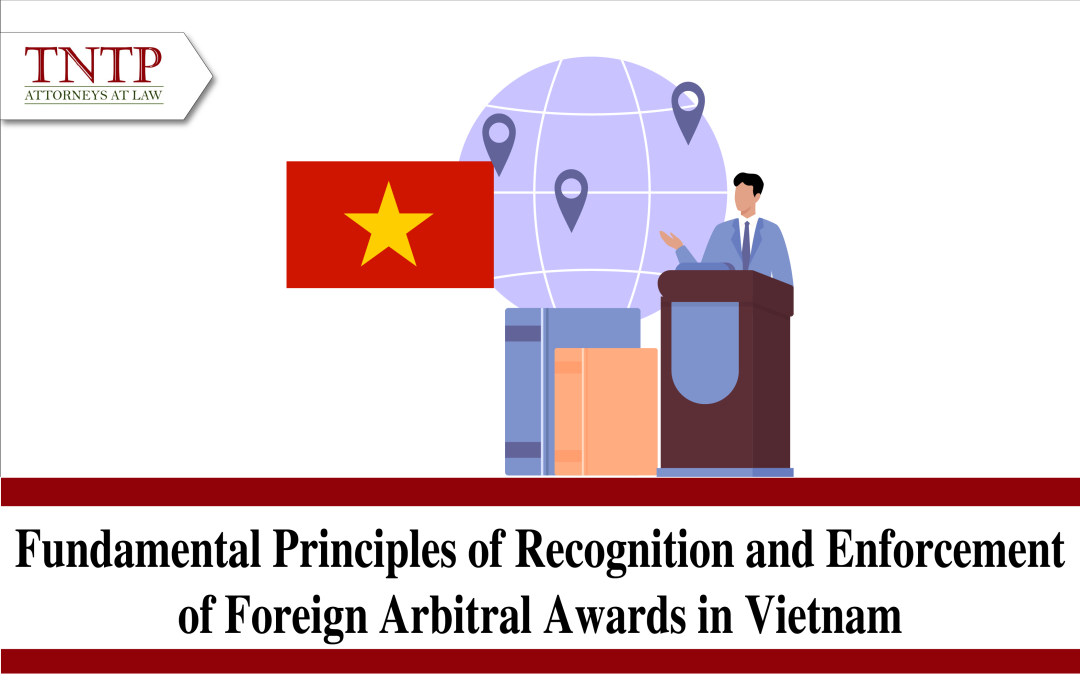Arbitration is a commonly used method for resolving international commercial disputes. According to the principle of territoriality, an arbitral award is only effective within the jurisdiction of the country where the award is issued. Therefore, for an award issued in one country to be enforceable in another country, the parties must go through the process of recognition and enforcement of that award. In this article, TNTP will present the fundamental principles of recognition and enforcement of foreign arbitral awards in Vietnam.
1. First principle: Based on international treaties
According to Clause 1, Article 424 of the 2015 Civil Procedure Code, a foreign arbitral award will be considered for recognition and enforcement in Vietnam if both countries are members of an international treaty on the recognition and enforcement of foreign arbitral awards.
This principle was concretized in Article 1 of the 1958 New York Convention, of which Vietnam is a member. The scope of the Convention is defined as follows: i) It applies to the recognition and enforcement of foreign arbitral awards issued in the territory of any country other than the country where recognition and enforcement are sought and arising from disputes between legal entities or individuals; ii) It applies to arbitral awards that are not considered domestic awards in the country where recognition and enforcement are sought. The principles for applying the Convention include: i) The Convention applies to member states; ii) The Convention also applies on a reciprocal basis with non-member states; iii) The Convention only applies to disputes arising from commercial relations; iv) The principle of non-discrimination.
In addition to the 1958 New York Convention, the recognition and enforcement of foreign arbitral awards in Vietnam are also governed by mutual legal assistance agreements and investment promotion and protection agreements that Vietnam has signed with other countries around the world, such as agreements with Italy, Malaysia, France, Singapore, Cambodia, China, etc.
2. Second principle: Reciprocity
This principle highlights the importance of international relations, where a country grants foreign individuals or organizations the same treatment as it grants its citizens or organizations. Typically, this treatment is in the form of most-favoured-nation status, national treatment, or another special arrangement. In some cases, the principle may take a negative form, such as when a country imposes retaliatory measures if the rights of its individuals or organizations are restricted in another country.
This principle has not yet been specifically regulated in the 2015 Civil Procedure Code in terms of the legal basis, procedures, or authority for its application. However, the 2007 Law on Mutual Legal Assistance provides the legal basis for courts to apply this principle, based on the announcement by the Ministry of Foreign Affairs regarding the list of countries that apply the principle of reciprocity with Vietnam. Nonetheless, there is currently no mechanism to verify or compile a list of Vietnamese arbitral awards that have been recognized abroad. This principle is primarily applied based on mutual respect between countries.
The application of this principle by countries does not necessarily require them to be members of any international treaty on the matter. Therefore, Vietnamese courts can still recognize and enforce foreign arbitral awards if foreign courts recognize and enforce Vietnamese arbitral awards in their country.
3. Third principle: Not contrary to the fundamental principles of Vietnamese law
This principle is stipulated in point b, Clause 2, Article 459 of the 2015 Civil Procedure Code. It aims to protect the rights of the parties involved in cases with foreign elements and reflects respect for the law and national sovereignty. Foreign arbitral awards will only be recognised and enforced in Vietnam if they do not violate the fundamental principles of Vietnamese law.
This is the article “Fundamental Principles of Recognition and Enforcement of Foreign Arbitral Awards in Vietnam” that TNTP would like to share with readers. If there are any issues to discuss, don’t hesitate to contact TNTP for timely support.
Sincerely,







